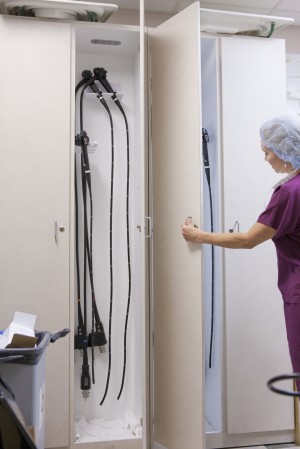
Colorectal cancer is one of the five most common cancers in both men and women, and it kills more than 43,000 Americans each year. As we learned today, colonoscopy is a successful screening method--it cuts the death rate of colorectal cancer in half.
Still, getting a colonoscopy has a problem: the yuck factor. That's why a study in today's New England Journal of Medicine caught my eye. Researchers in Spain looked at colonoscopy versus "FIT," a non-invasive test to screen for colorectal cancer. FIT--fecal immunochemical testing--looks for the presence of blood in the stool, a marker for benign polyps or cancer. Patients have either one colonoscopy during the ten years of the study or FIT every other year. (Note that the American Cancer Society has a great explainer of the different screening methods available and pros and cons of each).
In today's study researchers say colonoscopy and FIT detected roughly the same number of cancers. The report comes at the two year point of what will be a ten year study. We have to wait the full ten years to see how death rates from colorectal cancer compare between the two types of screening.
In the meantime, some interesting factoids that hint at the yuck factor popped up in the breakdown of which patients participated in which screening. Fully 94 percent of patients who responded to an invitation to participate in the FIT trial completed the test. But in the colonoscopy group, the rate dropped to 67 percent. In addition, more than 20 percent of the people who were assigned to colonoscopy opted for FIT instead. Apparently, they weren't so interested in having a colonoscopy. But they WERE interested in being screened.
For a little perspective on the study, I called Dr. Theodore Levin, who heads up Colon Cancer Screening for Kaiser Permanente in Northern California. "What's clearly shown here," he told me, "is that in order to get a large proportion of a population screened, you have to offer an alternative to colonoscopy."